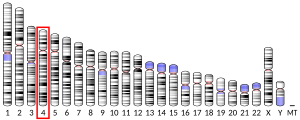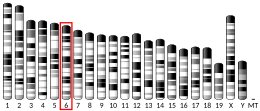ATOH1
Protein atonal homolog 1 is a protein that in humans is encoded by the ATOH1 gene.[5][6]
Function
[edit]This protein belongs to the basic helix-loop-helix (BHLH) family of transcription factors. It activates E-box dependent transcription along with TCF3 (E47).[6] ATOH1 is required for the formation of both neural and non-neural cell types. Using genetic deletion in mice, Atoh1 has been shown to be essential for formation of cerebellar granule neurons, inner ear hair cells, spinal cord interneurons, Merkel cells of the skin, and intestinal secretory cells (goblet, enteroendocrine, and Paneth cells). ATOH1 is a mammalian homolog of the Drosophila melanogaster gene atonal. ATOH1 is considered part of the Notch signaling pathway.
In 2009, ATOH1 was identified as a tumor suppressor gene. [7][8]
References
[edit]- ^ a b c GRCh38: Ensembl release 89: ENSG00000172238 – Ensembl, May 2017
- ^ a b c GRCm38: Ensembl release 89: ENSMUSG00000073043 – Ensembl, May 2017
- ^ "Human PubMed Reference:". National Center for Biotechnology Information, U.S. National Library of Medicine.
- ^ "Mouse PubMed Reference:". National Center for Biotechnology Information, U.S. National Library of Medicine.
- ^ Ben-Arie N, McCall AE, Berkman S, Eichele G, Bellen HJ, Zoghbi HY (September 1996). "Evolutionary conservation of sequence and expression of the bHLH protein Atonal suggests a conserved role in neurogenesis". Human Molecular Genetics. 5 (9): 1207–16. doi:10.1093/hmg/5.9.1207. hdl:11858/00-001M-0000-0010-50D1-1. PMID 8872459.
- ^ a b "Entrez Gene: ATOH1 atonal homolog 1 (Drosophila)".
- ^ "Cancer 'switch-off' gene found". 2009-02-24. Archived from the original on 2009-02-27.
- ^ Bossuyt W, Kazanjian A, De Geest N, Van Kelst S, De Hertogh G, Geboes K, et al. (February 2009). "Atonal homolog 1 is a tumor suppressor gene". PLOS Biology. 7 (2): e39. doi:10.1371/journal.pbio.1000039. PMC 2652388. PMID 19243219.
Further reading
[edit]- Helms AW, Johnson JE (March 1998). "Progenitors of dorsal commissural interneurons are defined by MATH1 expression". Development. 125 (5): 919–28. doi:10.1242/dev.125.5.919. PMID 9449674.
- Dintilhac A, Bernués J (March 2002). "HMGB1 interacts with many apparently unrelated proteins by recognizing short amino acid sequences" (PDF). The Journal of Biological Chemistry. 277 (9): 7021–8. doi:10.1074/jbc.M108417200. PMID 11748221. S2CID 39560486.
- Brown NL, Dagenais SL, Chen CM, Glaser T (February 2002). "Molecular characterization and mapping of ATOH7, a human atonal homolog with a predicted role in retinal ganglion cell development". Mammalian Genome. 13 (2): 95–101. doi:10.1007/s00335-001-2101-3. PMC 2262845. PMID 11889557.
- Leonard JH, Cook AL, Van Gele M, Boyle GM, Inglis KJ, Speleman F, Sturm RA (September 2002). "Proneural and proneuroendocrine transcription factor expression in cutaneous mechanoreceptor (Merkel) cells and Merkel cell carcinoma". International Journal of Cancer. 101 (2): 103–10. doi:10.1002/ijc.10554. PMID 12209986. S2CID 20592545.
- Gazit R, Krizhanovsky V, Ben-Arie N (February 2004). "Math1 controls cerebellar granule cell differentiation by regulating multiple components of the Notch signaling pathway". Development. 131 (4): 903–13. doi:10.1242/dev.00982. PMID 14757642. S2CID 44769279.
- Leow CC, Polakis P, Gao WQ (November 2005). "A role for Hath1, a bHLH transcription factor, in colon adenocarcinoma". Annals of the New York Academy of Sciences. 1059 (1): 174–83. Bibcode:2005NYASA1059..174L. doi:10.1196/annals.1339.048. PMID 16382053. S2CID 21443239.
- Sekine A, Akiyama Y, Yanagihara K, Yuasa Y (June 2006). "Hath1 up-regulates gastric mucin gene expression in gastric cells". Biochemical and Biophysical Research Communications. 344 (4): 1166–71. doi:10.1016/j.bbrc.2006.03.238. PMID 16647036.
- Mutoh H, Sakamoto H, Hayakawa H, Arao Y, Satoh K, Nokubi M, Sugano K (July 2006). "The intestine-specific homeobox gene Cdx2 induces expression of the basic helix-loop-helix transcription factor Math1". Differentiation; Research in Biological Diversity. 74 (6): 313–21. doi:10.1111/j.1432-0436.2006.00074.x. PMID 16831200.
- Park ET, Oh HK, Gum JR, Crawley SC, Kakar S, Engel J, et al. (September 2006). "HATH1 expression in mucinous cancers of the colorectum and related lesions". Clinical Cancer Research. 12 (18): 5403–10. doi:10.1158/1078-0432.CCR-06-0573. PMID 17000673.
- Tsuchiya K, Nakamura T, Okamoto R, Kanai T, Watanabe M (January 2007). "Reciprocal targeting of Hath1 and beta-catenin by Wnt glycogen synthase kinase 3beta in human colon cancer". Gastroenterology. 132 (1): 208–20. doi:10.1053/j.gastro.2006.10.031. PMID 17241872.
- Du X, Jensen P, Goldowitz D, Hamre KM (May 2007). "Wild-type cells rescue genotypically Math1-null hair cells in the inner ears of chimeric mice". Developmental Biology. 305 (2): 430–8. doi:10.1016/j.ydbio.2007.02.028. PMID 17397818.
- Westerman BA, Breuer RH, Poutsma A, Chhatta A, Noorduyn LA, Koolen MG, et al. (2007). "Basic helix-loop-helix transcription factor profiling of lung tumors shows aberrant expression of the proneural gene atonal homolog 1 (ATOH1, HATH1, MATH1) in neuroendocrine tumors". The International Journal of Biological Markers. 22 (2): 114–23. doi:10.1177/172460080702200205. PMID 17549667. S2CID 208043955.
- Scheffer D, Sage C, Corey DP, Pingault V (October 2007). "Gene expression profiling identifies Hes6 as a transcriptional target of ATOH1 in cochlear hair cells". FEBS Letters. 581 (24): 4651–6. Bibcode:2007FEBSL.581.4651S. doi:10.1016/j.febslet.2007.08.059. PMID 17826772. S2CID 13986512.
- Shroyer NF, Helmrath MA, Wang VY, Antalffy B, Henning SJ, Zoghbi HY (June 2007). "Intestine-specific ablation of mouse atonal homolog 1 (Math1) reveals a role in cellular homeostasis". Gastroenterology. 132 (7): 2478–88. doi:10.1053/j.gastro.2007.03.047. PMID 17570220.
External links
[edit]- ATOH1+protein,+human at the U.S. National Library of Medicine Medical Subject Headings (MeSH)
- ATOH1 and cancer suppression
- Human ATOH1 genome location and ATOH1 gene details page in the UCSC Genome Browser.
This article incorporates text from the United States National Library of Medicine, which is in the public domain.




